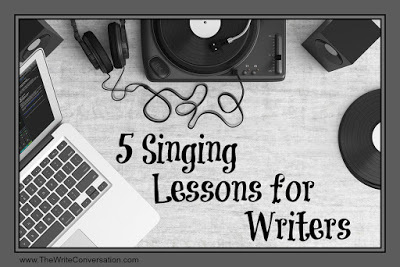5 Singing Lessons for the Writer
 5 Singing Lessons for Writersby Katy Kauffman @KatyKauffman28
5 Singing Lessons for Writersby Katy Kauffman @KatyKauffman28Every time I hear an incredible Christian soloist, I think, I want to write like they sing. The power in their voice, the soul-stirring words, the motivation I feel to live for God—it’s inspiring. I’ve always wanted to be a singer; however, God didn’t bless me with a singing voice. But He has called me to write.
Have you ever read a book, an article, or a blog post, and heard a “song” in it? Did the words powerfully stir your soul? Could you hear the melody behind the lyrics? Did the message stick with you like a favorite song? We can write like that. The question is how.Even if someone has a beautiful voice, they have to develop it. They have to take lessons and practice. They have to learn both the technical aspects of singing and the artistry of it. So do we as writers.
It takes time to learn how to sing as we write. But the time you invest produces beautiful results. Use the following “lessons” to fine-tune your writing so people hear the melody in your message.
5 Singing Lessons for the Writer
1. Try out your voice, no matter how shaky it is.
Write down your first thoughts about your subject, so you can get them on paper or in your computer. Just a few pages or so. Say what you want to say to your target audience.
2. Breathe deeply, inhaling beautiful melodies and exhaling fresh ideas.
Take the time to read a little of your favorite authors’ books, so you can analyze their style. Note their word choice, cadence, and voice (tone). Then write down ideas for your own book. How “down to earth” or “poetic” do you want your wording to be? How often do you want to use short sentences versus long ones? What tone do you want to have toward the reader?
 Tune your voice to inspiring, encouraging, and
Tune your voice to inspiring, encouraging, andsoul-stirring; and adjust your lyrics.3. Tune your voice to inspiring, encouraging, and soul-stirring; and adjust your lyrics.
Refine your voice in your writing to sound like the inspiring authors you love, but remember to let your own personality shine. There’s only one you.
Look at your wording and replace mediocre nouns and verbs with vivid ones. Mix short and long sentences for comprehension and cadence (to sound good to the “ear” of the reader). Use short sentences to emphasize a point or end a paragraph. They’re dramatic.
4. Read your writing aloud, and listen for the melody.
Do your words flow well? Do the syllables and sentences form a pleasing cadence to your ears?
If you get stuck trying to make the words sound melodious, read a few sentences by your favorite authors again. Don’t just focus on the words and grammar, but let the feel of the words sink in. Fine tune your own wording to reflect the feelings you want to stir inside the reader. Don’t fall into the trap of becoming melodramatic, but never divorce writing from emotion. Emotions stir us to act on what we have read.
5. Before you publish your “song,” ask a friend if they can hear the music in your writing.
Are they inspired by what you wrote? Can they hear the melody in it? Do they appreciate the lyrics? Keep tweaking your writing and getting enough feedback to know when your song is ready for the stage.
Remember: practice, practice, practice. Every artist becomes better with practice, either with the microphone or the pen. Ask God to help you know how to craft your message, and trust Him for an opportunity to sing.
Tell us in the comments below what makes someone’s writing sound like a song to you. Keep singing, and don’t forget to join the conversation!
TWEETABLESMicrophone or pen, every artist becomes better with practice - @KatyKauffman28 (Click to Tweet)
5 Singing Lessons for the Writer - @KatyKauffman28 on @EdieMelson (Click to Tweet)
 Katy Kauffman is an award-winning author and a co-founder of Lighthouse Bible Studies, a ministry which seeks to connect people to God through His Word.
Katy Kauffman is an award-winning author and a co-founder of Lighthouse Bible Studies, a ministry which seeks to connect people to God through His Word.
She has taught the Bible to women and teens, and has two published Bible studies for women, 2 Timothy: Winning the Victory and Faith, Courage, and Victory which won the 2016 Selah award for Bible studies. She is an editor of Refresh Bible Study Magazine and the designer of Broken but Priceless: The Magazine. She makes her home near Atlanta, Georgia.
Published on September 21, 2016 01:00
No comments have been added yet.



